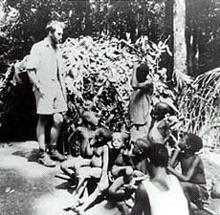 |


|
|
The Life of Colin M. Turnbull In the Arms of Africa: The Life of Colin M. Turnbull by Roy Richard Grinker; St. Martin's Press, 354 pages; $27.95.  Colin Macmillan Turnbull (1924-94) was a Scottish-born anthropologist who, along with
Margaret Mead and Louis Leakey, took that dismal science out of academia and to the
attention of the reading public.
Colin Macmillan Turnbull (1924-94) was a Scottish-born anthropologist who, along with
Margaret Mead and Louis Leakey, took that dismal science out of academia and to the
attention of the reading public.
His first and greatest book, The Forest People (1962), a detailed though idealized study of the Mbuti Pygmies, was a bestseller that made Turnbull both rich and famous. Equally popular but more controversial was The Mountain People, a curator at the American Museum of Natural History and a professor at several U.S. universities. (He became an American citizen in 1965.) Though Turnbull is worth reading about for his contributions as a scholar and as a writer, we are more interested in his personal life, both for its own sake and for its impact on his work. Though Turnbull never saw himself as gay in the political sense of the word – biographer Roy Richard Grinker calls him "pre-gay" - he was always honest about his same-sex relationships. Himself a member of an outcast minority, Turnbull sympathized with discriminated groups like the Mbuti Pygmies and, later, African-Americans and death row inmates.
Towles was an aspiring actor and writer with limited talents and even fewer visible qualities. This did not keep Turnbull, who fell in love at first sight and for all time, from trying to mold Towles in his own image and likeness: "Turnbull spent much of his life attempting to shape Towles into a world-class scholar. He became convinced that he could single-handedly bring to life the brilliance of Towles's undiscovered and unpolished mind." Unfortunately for Turnbull, nobody else - not even Towles - was convinced of Towles's greatness, and their 29-year relationship degenerated into a mess of personal and professional turmoil, alcoholism, and violence. That the two stayed together was mostly due to Turnbull's incredible love and loyalty. It must be said, in all fairness to Towles, that it wasn't easy for the younger man to live in the shadow of an overbearing ego who smothered him and eliminated his identity. Being a black gay wasn't easy either, nor being part of an interracial couple in rural Virginia, where the two lived for most of their partnership. That the partnership survived at all was an achievement that transcended the individual men: "In the end, Joe seems to have achieved little more than a tragic existence. Of course, Joe and Colin did achieve something great together: they managed to remain married for nearly thirty years." When Towles died of AIDS-complications in 1988, Turnbull symbolically buried his spirit next to Towles's body, donated his money to the United Negro College Fund in Towles's memory, and became a Buddhist monk.
In fact it was Grinker's attempt to debunk Turnbull's "romantic" account in The Forest People that led Grinker to study his predecessor. Though Grinker is critical of Turnbull's methods and motives as an anthropologist, he is surprisingly sympathetic with Turnbull the man, though like everyone else Grinker can't understand what Turnbull saw in Joe Towles. Here again Turnbull is to blame; for in trying to make the world see Towles through his own rose-colored glasses, he denied the younger man the power to speak for himself. Colin Turnbull died of AIDS-complications in 1994. Six years after his death, both The Forest People and The Mountain People remain in print. As an anthropologist, Turnbull was limited by his biases, and his books remain controversial. On the other hand, his love and devotion, even when misguided, touch us in a way that his books never could. Unhappy and frustrated by Western ways, Turnbull found love and happiness in Africa and with a son of Africa; and then tried to return his love every way that he knew. "Both Joseph Towles and the Pygmies were the creations of Colin Turnbull, who was motivated by a deep-seated wish to find goodness, beauty, and power in the oppressed or ridiculed and, by making those qualities known, reveal the evils of western civilization. The vision of the world he summoned was so perfect, so true, so right for him, that it gave all the appearances of being real." |
 © 1997-2000 BEI
© 1997-2000 BEI
 Colin Turnbull in Africa in 1953
Colin Turnbull in Africa in 1953